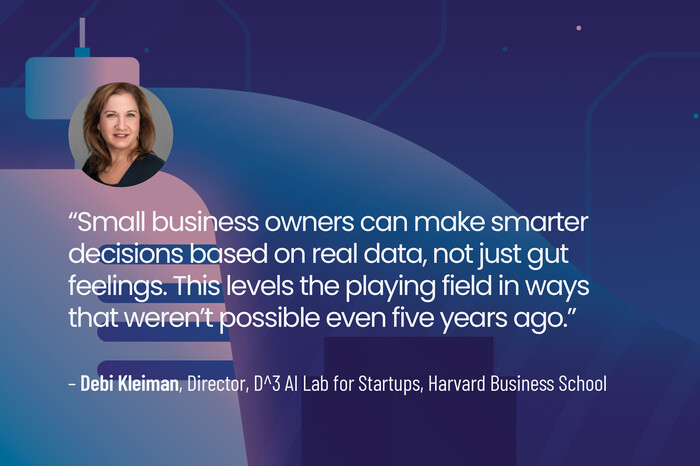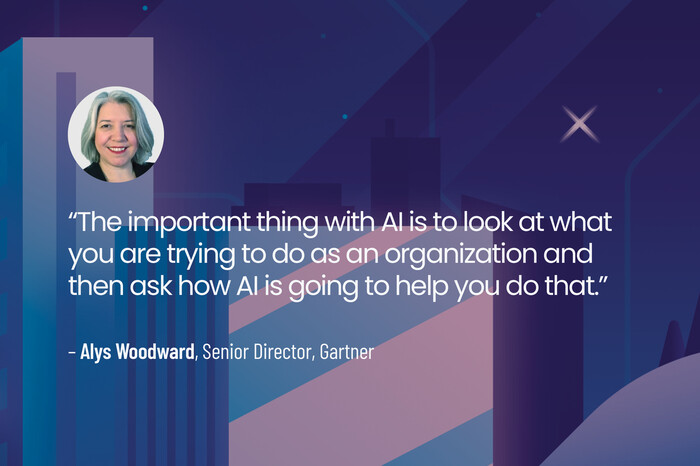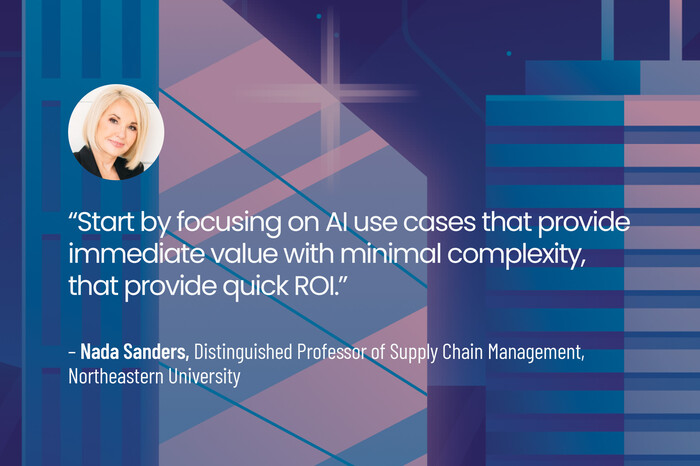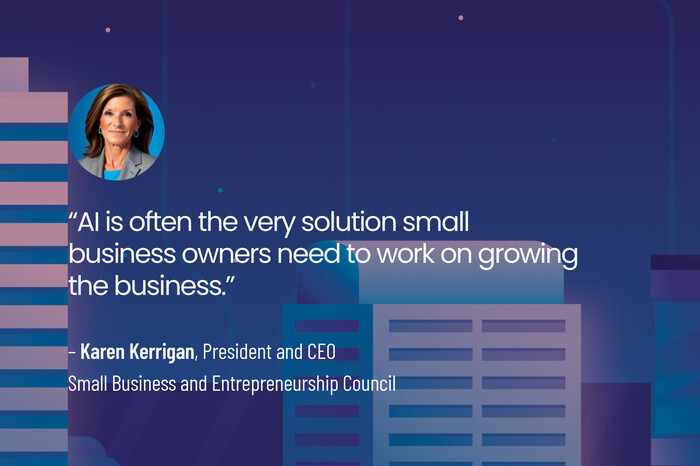Artificial intelligence, especially generative AI, is perhaps the hottest area of technology investment today. Many AI innovations have been aimed at the enterprise market.
However, small businesses are — and, according to experts, should be — investing in their own AI tools.
In fact, 72% of small-business owners and HR leaders have a positive view of AI, according to a Paychex report. And in 2024, the U.S. Chamber of Commerce found that 40% of small businesses use generative AI, nearly double the number that did in 2023.
Yet small businesses must be strategic in how they approach AI.
BizTech convened a roundtable of AI and small business experts — Nada Sanders, a professor at Northeastern University and author of The Humachine: Humankind, Machines and the Future of Enterprise; Debi Kleiman, director of the D^3 AI Lab for Startups at Harvard Business School; Karen Kerrigan, president and CEO of the Small Business and Entrepreneurship Council; and Alys Woodward, a senior director at Gartner specializing in AI and other emerging technologies — to better understand the promise and pitfalls of AI for small businesses.
Click the banner below to keep reading stories from our new publication, BizTech: Small Business.
BIZTECH: What are the greatest AI opportunities for small businesses?
Kleiman: AI is opening doors for small businesses in ways we’ve never seen. The biggest wins are in automating those tedious, day-to-day tasks that eat up your time: handling customer questions, scheduling appointments and keeping the books. This frees you up to focus on what can really grow your business. Plus, you’re cutting costs while delivering more consistent service to your customers.
What’s also game-changing about AI is how you now can have powerful data insights within reach, even for small shops. You don’t need a fancy data team anymore to understand your customers’ habits, optimize your pricing or predict what inventory you’ll need next month. Small-business owners can make decisions based on real data, not just gut feelings.
Kerrigan: It about saving time and money, increasing profitability, improving key decisions, and leveling up competitiveness via customer acquisition and service. During this period of continued uncertainty and high costs, many small businesses are turning to AI to reduce expenses, fill workforce gaps, and operate more productively and efficiently.
BIZTECH: What’s preventing small businesses from doing more with AI?
Kleiman: Most small-business owners I talk to feel completely overwhelmed when it comes to AI. They know it could help but have no idea where to start or which tools would actually solve their specific problems. There’s so much noise around AI, making it nearly impossible to separate what’s truly valuable from what’s just hype.
Then there’s the reality of running a small business: You’re already wearing 10 different hats with barely enough hours in the day. Who has time to learn complex new systems, or the budget to gamble on solutions that might not pay off right away?
When you’re facing urgent, day-to-day challenges such as making payroll or fulfilling orders, investing in AI easily slides to the bottom of the priority list, even when you know it might help long-term.
Sanders: Cost and accessibility are among the biggest barriers. It is true that many AI solutions require substantial upfront investment, whether in software, hardware or skilled personnel.
Unlike large corporations with dedicated AI teams and research budgets, small businesses often operate with limited resources, making it difficult to justify or afford AI adoption.
BIZTECH: Is AI a competitive equalizer for small businesses or an advantage for enterprises?
Woodward: AI is potentially an equalizer. Small organizations can have more manual processes because they haven’t had the opportunity to invest in things such as customer relationship management and enterprise resource planning or other technology. So then, because they’re doing more in a manual way, AI coming in there can help them a lot more.
Kleiman: I think it’s a bit of both. AI has definitely democratized access to tools that small businesses could only dream about before. That said, big companies still have advantages. They have massive data sets and the resources to build custom AI solutions. Where small businesses can really shine is in being nimble and focused. Instead of trying to match the big guys feature for feature, smart small businesses are picking specific areas where AI can amplify their unique strengths.
Kerrigan: When we ask small-business owners about how AI tools have benefited their businesses, the three responses that rank at the top are that these tools help their business compete more effectively against larger businesses, improve the speed and quality of decision-making, and help the business acquire customers.
Small-business owners feel empowered by AI, as it frees them and their employees from menial tasks, allowing for more time dedicated to innovation and identifying opportunities that the big guys may be missing or messing up on.
Click the banner below to read the 2025 CDW AI Research Report.
BIZTECH: What use cases should small businesses be working on? Where should they start?
Kleiman: Start with the customer-facing stuff that directly impacts your bottom line. Setting up AI-powered chat on your website to handle basic customer questions 24/7 is a no-brainer, or using AI tools to make your marketing more targeted and personalized. These applications typically start paying for themselves almost immediately. You’ll see it in your numbers.
Sanders: Focus on use cases that provide immediate value with minimal complexity. One of the best starting points is customer service automation. AI-powered chatbots and virtual assistants can handle FAQs, schedule appointments, process simple requests and even assist with sales inquiries. This can improve response times and customer satisfaction, and reduce the need for constant manual support.
Woodward: The important thing with AI is to look at what you are trying to do as an organization, then ask how AI is going to help you do that. Are you most concerned about revenue growth, saving costs, improving operational efficiency or other forms of value, such as customer satisfaction? Then, work backward from that as to where the AI going to help you.
BIZTECH: How will AI evolve over the next five years, and how will that affect small businesses?
Kleiman: AI will become so deeply woven into business software that you’ll barely notice it’s there. We’ll see more industry-specific AI solutions tailored for everything from local restaurants to small law practices. The technology will become even more accessible; you won’t need any technical background to use it effectively. There will be drag-and-drop interfaces where you can create your own custom workflows without writing a single line of code.
Sanders: AI won’t be a luxury but a necessity. Small businesses that start integrating AI now — focusing on automation, data insights and customer experience — will be better positioned to thrive in an AI-driven economy. The key will be staying agile, continuously learning and leveraging AI to enhance human capabilities.
Woodward: All businesses have manual tasks that, in theory, you shouldn’t need to do — pasting spreadsheets into each other and all sorts of stuff. Many of those inefficiencies will go away. And so, in some places, that will mean that pockets of employment are reduced because things are easier to do. But small businesses will also be able to understand consumers better. Being able to quote pricing more accurately, for example, makes you more competitive.
BIZTECH: How can small businesses stay on top of AI evolution without chasing every new “shiny object” innovation?
Kleiman: Don’t start with the technology, start with your problems. Where are you losing customers? What tasks drain too much of your time? What’s preventing you from scaling? Once you’ve identified these pain points, look for established AI solutions that specifically address them. This keeps you focused on tools that will move the needle for your business and aren’t just the latest buzzworthy AI features.
Keep your learning manageable. You don’t need to become an AI expert or read every tech publication. Set aside a couple of hours each month to check in on developments that might actually matter for your specific challenges. Follow a few practical voices on social media who filter out the noise and focus on real-world applications. Remember, successful small businesses aren’t using AI to win innovation awards. They’re using proven, practical tools that directly improve their customer experience or boost their bottom line.
Sanders: Instead of investing heavily in emerging AI technologies, small businesses should prioritize AI solutions that integrate seamlessly into their existing workflows, such as automation tools for customer serv-ice, marketing and operations.
Kerrigan: The newest, trendiest thing is not necessarily the best or most effective thing. And that certainly is the case when it comes to AI tools. It’s important for business owners to talk to peers about their experiences, do some thoughtful research, and talk to employees about whether the newest thing will add value and yield the ROI desired.
Woodward: Look at what your vendors are doing. Many smaller organizations have fewer vendors on whom they are more reliant than large organizations. Look at what your vendors are doing, and see whether it will benefit you to consume it. But keep strong in the sense of who you are as an organization.

















